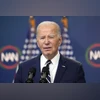By Eric Martin and Shawn Donnan
A US plan to raise billions of dollars in additional resources for the World Bank to counter China’s lending to the developing world has stalled less than nine months after President Joe Biden made it a centerpiece of his meetings with fellow Group of 20 leaders last year.
The plan, championed by Biden and the White House at last September’s G-20 leaders summit in New Delhi, was to send $3.3 billion to the World Bank, led by its new president, Ajay Banga.
That capital would be used to generate more than $25 billion in US-backed financing and grants for developing countries. It was part of a broader plan to increase World Bank resources by $200 billion with injections from other shareholders.
The White House pitched the move, which requires congressional authorisation, as a counter to Chinese lending practices across the world, which it describes as a tool of economic coercion.
Yet the proposal has failed to win congressional approval or attract similar bids from other allies in the G-20 or even Group of Seven countries, which are more closely aligned with Washington.
More From This Section
As the World Bank and International Monetary Fund host their spring meetings in Washington this week, that setback has been obscured on Capitol Hill by a larger funding clash over assistance for Israel, Ukraine and bitter disputes over US border security.
The lack of progress has raised questions about US leadership within multilateral institutions like the World Bank and how Washington’s focus on China, also a major shareholder of the IMF and World Bank, is hurting those multilateral bodies.
A spokesperson for Biden’s National Security Council said in a statement that the administration remained committed to its pledge to help increase the bank’s resources and had an active request to Congress in its fiscal 2025 budget proposal. The proposal to bolster the World Bank was the most cost-effective way to provide financing to developing countries, the spokesperson said.
The US Treasury Department, without commenting on the recent push for new funds, pointed out that the US contributed $1.9 billion to multilateral development banks last year, which provided more than $145 billion to developing countries. Under the Biden administration, the US also contributed $1 billion to the United Nations Green Climate Fund meant to help developing countries slash greenhouse gas emissions and adapt to climate change.
In a speech in Washington last week, Treasury Undersecretary for International Affairs Jay Shambaugh highlighted Biden’s request to Congress for additional World Bank funding as part of a broader plan to help poor countries now suffering from heavy debt loads and higher interest rates.
He also referred to broader efforts to reform the World Bank and increase its resources that are being led by President Ajay Banga, the former Mastercard chief executive officer nominated by the US last year.
“All stakeholders will find the United States an enthusiastic partner and leader in realizing this vision,” Shambaugh said.
The Biden administration is also facing criticism that it can’t deliver on its international promises because of its own domestic political challenges, illustrating how this dysfunction is hurting America’s ability to sustain its post-World War II economic leadership.
Karen Mathiasen, a former Treasury official and US representative at the World Bank who’s now at the Center for Global Development, a think-tank, said Biden had miscalculated by putting the pledge of additional funding at the center of his G-20 appearance.
Its prospects even then seemed remote with a Republican-controlled House of Representatives, she said. Allies have failed to follow Biden and make their own pledges, leading to “a very public display of a weakening of US leadership,” Mathiasen said.
Republicans oppose Biden’s campaign for the World Bank to focus on climate change, and many of them are suspicious of international institutions.
Mathiasen added that the Biden administration was unlikely to garner support from Congress for additional World Bank funding unless Democrats win control of both chambers in November’s elections.
“It was especially risky for Biden to promise this mostly green aid at the G-20 meeting when he knew a GOP House would never approve it, adding to the narrative that the US doesn’t keep its promises,” said DJ Nordquist, the US representative on the bank’s board during the Trump administration.
Banga, the World Bank’s president, says the lender must become faster, more efficient and eventually larger so that it can help fund some of the trillions of dollars in global development needs and maintain its relevancy in the coming decades.
The World Bank’s two major lending arms committed a combined $72.8 billion last year, with total cumulative lending since 1945 at nearly $1.4 trillion.
Banga replaced David Malpass, who was nominated by Trump in 2019 and stepped down last June, almost a year early.
Banga’s presidency gives the Biden administration a chance to evolve the Washington-based institution toward a greater focus on climate change, as environmental activists had said Malpass wasn’t providing leadership on the issue. Malpass has rejected that view and defended his record on climate.

)
